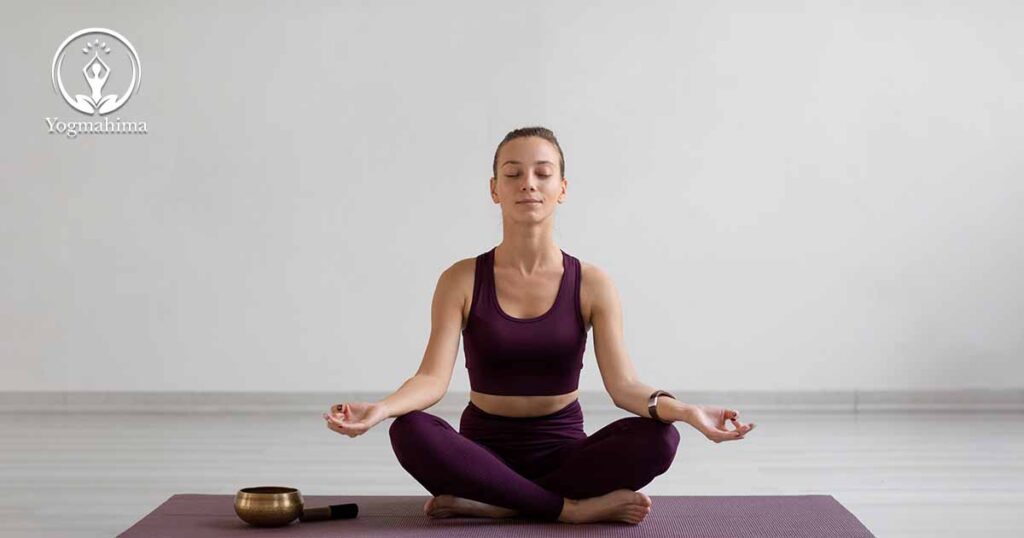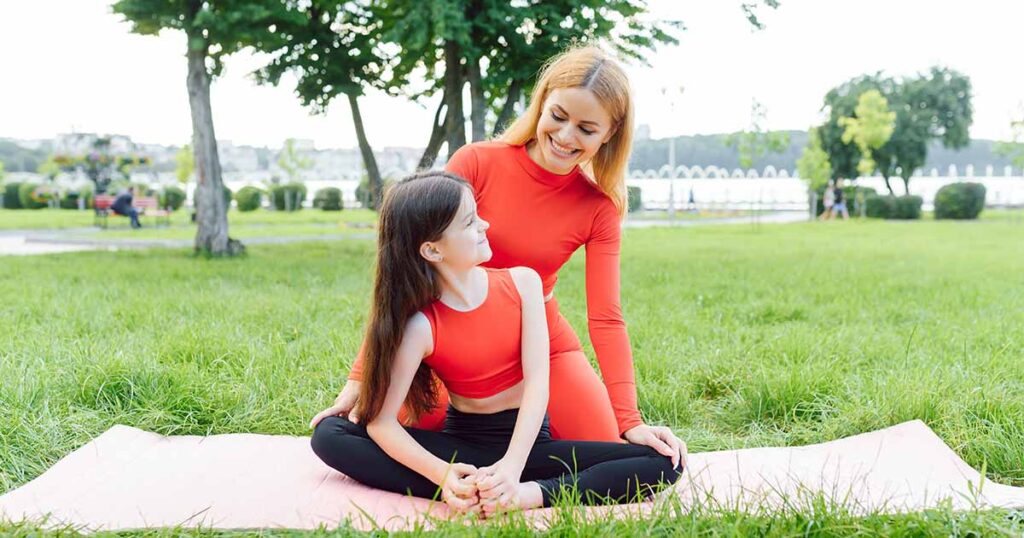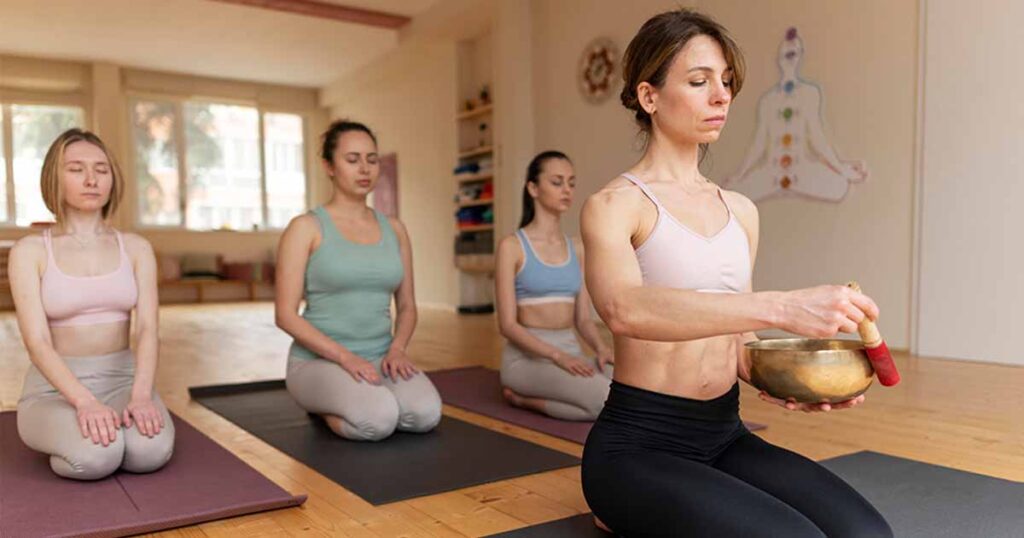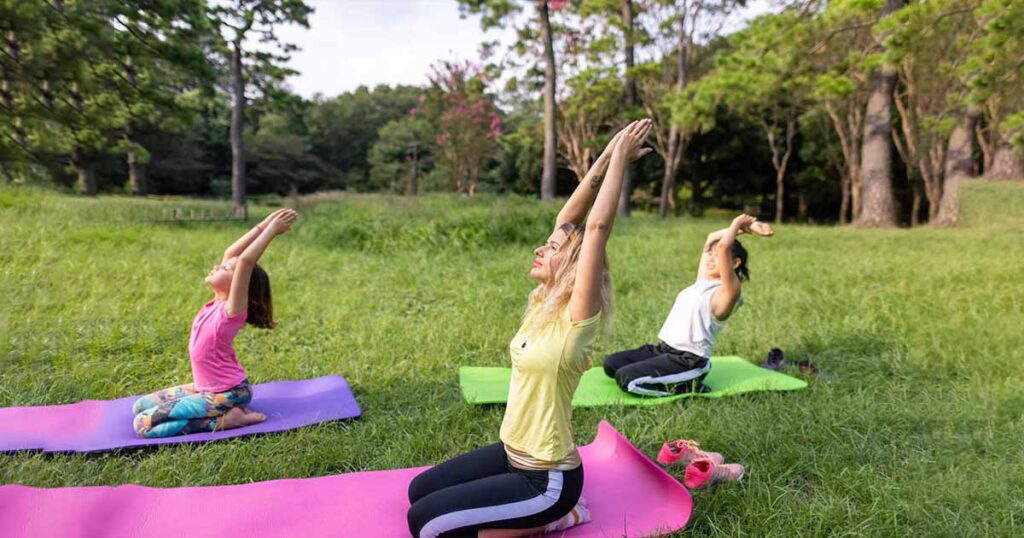
According to statistics published in The Economics Times, it is mentioned that 1 in every 5 individuals suffers from one or more forms of mental health illness symptoms. About 50% of mental issues start by 14 years of age, and 75% of the cognitive problems develop by the age of 24%.
Much is known about the benefits of mindfulness and Yoga can do to you. But have you ever questioned the impact of mindfulness Yoga on your mental health?
Then you have come to the right place! Today, we will discuss this holistic approach to mental health and how it can benefit you.
What is Mindfulness Yoga?

It is the combination of Buddhist-style mindfulness and the practice of Yoga as a form of exercise through meditation to address the mental stress you are going through.
The mindfulness yoga practice was introduced by Professor Jon Kabat-Zinn, who used mindful yoga to treat stress at the Mindfulness-Based Stress Reduction Clinic in America in 1990. However, the beginning of Yoga dates back to ancient times in India, and you can find evidence of this in the terracotta of the Indus-Valley civilisations.
When discussing mindfulness, it is about training oneself to focus or concentrate on what is happening now. In a world of constant hustle and distraction, trying to be present can be challenging, but mastering it can help yield so many benefits to your mental and emotional health.
However, many of you may be confused about the difference between mindful yoga and various yoga practices. Simply put, when discussing the pursuit of mindfulness when doing asanas.
A Holistic Approach to Mental Health Through Mindfulness Yoga

When it comes to talking about mindful yoga it means having precise, defined and repeatable steps that you can practise regularly to achieve a holistic approach to mental health. Here are some steps to begin:
1. Mindfulness of Your Body
Your body is a collection of different parts, including skin, bones, muscles, heart, lungs, teeth, etc. So, practising mindfulness yoga means instead of looking at the general, i.e. body; you will observe your body part by part.
2. Mindfulness of Your Mind
When doing the asanas, observe whether you are conscious or aware of the current moment. So, pay attention to your thoughts as they arise and pass again.
3. Mindfulness of Your Feelings
Doing mindful yoga means paying attention to how your bodily sensations and emotions. So, learn how to observe how you feel as they come and pass and avoid judging yourself who you are, as it is just a feeling.
4. Mindfulness of Dharna
Here, it is the practice of awareness of the inter-existence of all things and being aware that all these are temporary and will go away, and they don’t define who you are.
Top Mental Health Benefits of Mindfulness Yoga

There are various benefits from the regular practice of mindful yoga. So, today, let’s look at the top benefits of practising yoga for inner peace and calm of the mind. There are:
1. Better Understanding of Oneself
Doing mindfulness yoga allows you to be more aware of yourself, the emotions, and the physical sensations you are going through, allowing you to understand yourself better and improving your overall well-being.
2. Improve Your Concentration and Focus
In an era where concentrating is hard and most of the time we are distracted, mindful yoga promotes mindfulness and being present-moment, increasing your focus and concentration levels. Moreover, it can enhance your cognitive function, memory, and learning.
3. Reduce Your Feelings of Stress and Anxiety
Doing mindful asanas allows you to relax while still promoting a sense of calmness. Practising mindfulness will enable you to become more in tune with your thoughts and emotions, reducing negative feelings and increasing your favourable feelings. A relaxed and calm mental being also enables you to sleep much better.
4. Promote Emotional Balance
Mindfulness yoga promotes emotional balance when you combine physical postures with meditation and breathing techniques. It supports overall yoga for emotional balance by lowering stress, enhancing self-awareness, and cultivating a sense of serenity.
Different Types of Mindfulness Yoga Techniques to Start Incorporating

If you are looking for different types of mindfulness yoga for stress management, here are some ways to start incorporating daily.
- Become conscious of yourself.
- Practice short-period mindfulness as a beginner.
- Mindful breathing and eating.
- Make a conscious effort.
- Listen to music or the noise around you.
- Do walking meditation.
Top 4 Mindfulness Yoga Poses for Stress Management

Here are the best mindful yoga poses for a mind-body connection:
1. Mountain Pose or Tadasana
- Stand tall with your toes together while your heels are slightly apart.
- Lift and spread your toes and lower them back to the ground.
- Lengthen your spine, keep your shoulders relaxed, and breathe deeply.
- Focus on the connection between your body and the earth.
2. Tree Pose or Vrikshasana
- Stand on one leg, placing the opposite foot on the inner thigh.
- Balance and bring your hands together in front of your chest.
- Concentrate on your breath and the balance of your body.
- Hold this pose for 10-30 seconds.
3. Warrior II or Virabhadrasana II
- Stand with legs wide apart, turning one foot out and bending the knee.
- Extend your arms parallel to the floor, gazing over the front hand.
- Feel the strength and stretch in your body while focusing on your breath.
4. Corpse Pose or Savasana
- Lie flat on your back with arms and legs relaxed.
- Close your eyes and breathe deeply, letting go of any tension.
- Focus on the sensations in your body and the rhythm of your breath.
Conclusion
To conclude, practising mindfulness yoga can help in managing your stress. Gain mental benefits through regular mindful asanas with the help of professional trainers. YogMahima is one of the best schools to learn Yoga with traditional Hatha to Ashtanga yoga to meditation and pranayama.
With a diverse range of courses, you can gain the mental health benefits of mindfulness yoga by registering at YogMahima. We offer pregnancy or prenatal yoga, meditation, acupressure, arts & dance, music, etc. If you are confused about enrolling immediately, begin with a 1-day trial.
FAQs
1. What is the difference between yoga and mindfulness yoga?
Yoga combines physical postures, breathing exercises, and meditation for overall health, whereas mindfulness yoga focuses on the present moment. It is aware during practice, focusing on your breath and body sensations to build a deeper mind-body connection and emotional balance.
2. How do I start practising mindfulness?
You can begin practising mindfulness by setting aside time each day to sit quietly, focus on your breath, and focus on your thoughts, feelings, and sensations without judgment. Gradually increase your practice time and incorporate mindfulness into daily activities.
3. What are some of the mindfulness activities that I can start with?
Start with mindful breathing, body scan meditation, mindful eating, and walking meditation. These practices will help you develop an awareness of the present moment, reduce stress, and improve your overall well-being by fostering a deeper connection to your experiences.
4. How can mindfulness yoga help manage stress?
Mindfulness yoga helps manage stress by combining physical movement with mindful awareness. So, you can start focusing on your breath and body sensations during yoga practice, which calms the mind, reduces anxiety, and promotes relaxation, leading to better stress management and emotional resilience.
5. Which yoga is best for emotional balance?
Hatha yoga is particularly beneficial for emotional balance as it incorporates gentle postures, breathing exercises, and meditation. This practice promotes relaxation, reduces stress, and fosters a sense of inner peace and emotional stability through a mindful approach.
Also Read:
Top 10 Hatha Yoga Poses for Beginners
7 Essential Yoga Poses to Avoid During Pregnancy
8 Best Yoga Poses for Core Strength
Discover the Best Yoga Poses for Lower Back Pain



No Comments yet!